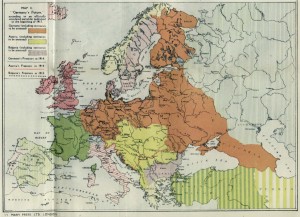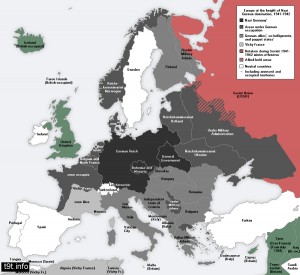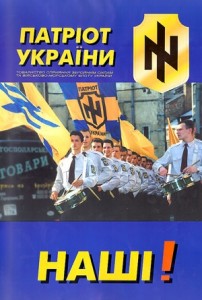Ruled by a vassal government in the Neuordnung Europas, deluded Britons imagine they won the war
While Eastern Ukrainians meet EU expansion with armed force, in Britain, at the other end of Empire, the people are pathetically cowed in contrast. As if to flaunt their wretched yellow-bellied hopelessness, the most shameful thing that British people say in response to their defeat and conquest – which is indicated clearly by the obvious rule of a vassal government from Westminster on behalf of Brussels, although in a deeper level of cowardice lots of people manage to happily ignore – is with regards the invasion of millions of people from the Empire’s slave (wage) provinces: they say, “as long as they come here to work, I don’t have a problem”.
Given that 90% of these immigrants are in low skilled labour – equating to hundreds of thousands of jobs that should have been in the possession of Britons – and that they are eligible to, and do claim in-work benefits to the tune of millions of pounds, and that generally, as a recent study showed, their net tax contribution to the welfare pot is negative, the British apology is a complete nonsense. In fact, it is a dreadful and appalling insult to generations of British who lost their lives defending the country from hostile continental powers. The most recent, the fathers of the Baby-Booming generation, and the grandfathers of the Generation-X, would be spinning in their graves after their particularly bloody forfeiture if they knew, as is now generally realised by yet living patriots, that residing in Britain, in their millions, are people from all over what could yet be called Nazi-dom – or if we’re being polite, the United States of Europe (a Nazi concept – one cannot avoid the link after all). Moreover, with Ukraine in the process of being pried away from its historical relations with Russia and into the greedy arms of the EU, the situation as a whole would look to the ghosts of Britain’s sacrificed-in-war as if they had in fact lost their monumental global conflict and died for nothing – and they would be correct.
The word “Nazi” has been used before in relation to the EU, and many a British reader will read “German” instead. There is a belief that Germany controls the EU – it is not entirely correct, and it is rather lazy. At the root of the misunderstanding is the nature of the force that wilfully caused the destruction of Europe in the 1940s. How people are still so terribly deceived about this is typically illustrated in the way the Nazis are routinely portrayed as being of the “right-wing”. This is wrong, not least because of the use of the meaningless political spectrum as a measure.
Nazism was at its heart a freemasonic secret society – at its core was a pagan religious belief system largely flavoured by the 19th century fashion for central European mythology and medieval romanticism. Driving a lot of this was a desire for German-Austrian unification, and generally there was a craze for this stuff out of Victorian times – it encapsulated the promotion of eugenics as a serious science. Indeed, we could interpret Hitler’s attitude to the final defeat of the Germans as the acceptance of a Darwinian outcome that suggested those people not fit to be vehicle for the religion – his sentiments seem strange to comprehend without knowledge of this context. The belief in the Aryan race – in actual fact an invention by Ukrainian-born German mystic Madame Blavatsky (born von Hahn) – was an expression of the crux occultism of Nazism. All mystery religion is about ascendance of god-aspirants – the Aryans were the people most likely due to their racial piety, and therefore they were the superior race (of course, it is twisted). Blavatsky was a central figure in Victorian New Age pseudo-science mumbo-jumbo, and she in turn influenced one Guido von List. He was very popular in central Europe at the turn of the century, and his prophesising of a German Christus to save the world was a favourite of leading-lights in the predecessor of the Nazi Party. The Thule Society – what looks very much like a freemasonic brotherhood with very well-to-do membership – sponsored the Deutsche Arbeiterpartei, the German Workers’ Party. Von List’s influence on occult Nazism seems to have been denied a great deal in the years since, and is called controversial in Wikipedia. However, the links are apparent. He theorised the Armanen – heirs of the sun god and a German priest-king and aristocratic class who knew the ancient gnosis. These were spiritual ancestors of the SS – a state within a state – a movement above the political Germany. [The author recommends the works of Milton William Cooper (which got him murdered by the US Government) for an introduction into this topic – recordings of his 1990s radio shows can be found here].
People blame Germany the country for being the initiator of World War II. In fact the culprits were an “illumined” class with a religious belief in a national destiny for a race of people which crossed contemporary international borders. Nazi-dom already lay beyond the confines of Germany before the war started – in the minds of the adherents of a New Order for mankind. Of Germany’s vanquished, it’s the author’s suspicion that the readiness of many elites and would-be-governors to betray the political entity they had hitherto called their country was due to subscription to the same ideology through membership of affiliated secret societies. In any case, lots of countries had their own Nazi parties, and they would accept dominance from Berlin to bring about a shared vision – even the least likely had groups who were ardent collaborators, as this piece about Polish complicity in the Holocaust relates (and let us be of no doubt, there would have been eager helpers in Britain too – this is not a reference to Oswald and his uniform-wearing clowns). In the German language, the Nazis called this the Neuordnung Europas, the reorganisation of Europe – the European New Order.
If we look at a few maps, we can see what was had in mind. The Allied map showing a surmising of German ambitions during World War I is valuable because, although it is propaganda, it must be based on a range of intelligence that we cannot access at this distance more readily than we do in this one picture – it is assumption that exploits the common knowledge of the day. Austria-Hungary and Germany – with the Bulgarian satellite – is to stretch from the English Channel down to the Caucuses – Central and Eastern Europe unified. Next, the map of the conquests of the Nazis at the height of their powers resembles the spread into Eastern Europe of the other map – the main difference is the spread to the west which was militarily necessary to subdue opposition to the eastward expansion.
This was the Generalplan Ost in action – the carving out of the lebensraum. Like all freemasonic secret societies who get into power (see the Fabians) their elitism always translates into collectivism for everyone else (see the current British welfare state). The same elitism inevitably also produces a self-convinced righteousness that allows for a mindset which rationalises the slavery of an undeserving or an undesirable class. So creating lebensraum would of course mean displacement for people who the German Nazis didn’t think were racially suitable. Generalplan Ost visualised the following percentages of people would be subject to removal from lands coming under direct German control: Poles 80-85%; Russians 50-60% to be physically eliminated, 15% to be sent to Western Siberia; Belarusians 75%; Ukranians 65%; Lithuanians 85%; Latvians 50%; Estonians 50%; Czechs 50%; Latgalians (ethnic Latvians) 100%. Countries in the Reichskommissariat Kaukasus would have their own vassal governments and autonomy for various indigenous groups – this is perhaps a clue to the extent of where the German Nazis thought that Nazi-dom stopped. And note, the percentage of people not to be dealt with by removal were considered fit for Germanization or as a racially acceptable Mittelschicht.
Back to the future, and people nowadays are aware of the supposed caliphate that radical Islam wants to recreate across Africa, Europe and Asia, but they are not aware of the desire to resurrect the Nazi-dom. One may even ask, is there such a thing? People talk about a plan they cannot prove involving Germany wanting to dominate Europe through the EU. In response the author would say that the Anglo-American corporate-government uses the EU to its own ends and so presumably lets Germany have some degree of domination. While Germany has financial clout, physical territorial subjugation would be another thing altogether and would rely on EU-wide, if not American, support. On the other hand, if we look at things not from the point of a view a country of people having a plan to control other nations, but instead beginning with a premise that there are adherents of an international ideology – we’re calling it Nazi-dom – working towards what they believe is their freemasonic Great Work, then imagining a Europe dominated from a spiritual centre of Berlin is an easier thing to do. UKIP MEP Gerard Batten, amongst many others, has rightly identified the EU as a Nazi plan from its very inception. This is not the same thing as a German plan. In the video linked to in the previous sentence, Batten is interviewed outside a Bilderberg meeting – this organisation is reckoned also to have Nazi roots – but its founder, Bernhard, was a Dutch Prince.
Moving on to another distinction – a thing isn’t of the Nazis if it doesn’t involve the core mystery religion belief system and therefore the supremacy of a racially-qualified elite. We might recently have had a brief and accidental insight into this world when the Prime Minister of Ukraine, Arseniy Yatsenyuk, said some very strange things on German TV. Before this is expounded upon, a run down of Yatsenyuk’s political career thus far is in order. Initially he was in an organisation called “Our Ukraine-People’s Self-Defense Bloc” which had been closely associated with Ukraine’s Orange Revolution. Yatsenyuk then led the “Front for Change” party (2008–2013), which merged into “Batkivshchyna”, or “All-Ukrainian Union ‘Fatherland’” (2013–2014). Yatsenyuk was then involved in the creation of a new party the “People’s Front” (2014-present) which appears to have been a breakaway from “Fatherland”. To an Anglosphere audience, the terms perhaps do not resonate very much if at all (and the author is by no means an expert, so please correct if any of the following is wildly wrong). The term Popular Front, or alternatively People’s Front, to keep this as simple as possible, was coined by communists to describe a coalition between workers and bourgeois political parties. 1930s communists saw Popular Fronts as a means, by exploiting nationalist tendencies and engaging in the capitalist political system, to oppose fascism. In fact, from the description, and understanding fascism as Marxism where government only controls the means to production (instead of outright owning it) it is difficult to comprehend them as being much different from the other – Popular Frontism appears to be a way of trying to gain power by wearing the other guy’s clothes. The word “Fatherland” is more readily identifiable as an expression of a nationalist concept.
Now for some personal detail: Yatsenyuk was born in the region of Chernivtsi which was incorporated into the Ukrainian SSR when the Soviets annexed Romanian territory in 1940. It was recaptured by German and Romanian forces in July 1941. His ancestors (and it is important in the context of this article to know about this) are Romanian. Claims that Yatsenyuk was born to a family of ethnic Jewish-Ukrainians made against him in 2010 during his presidential campaign were disputed by a Ukrainian chief rabbi. When considering all of this, the issue that presents itself the most readily is the question of what makes Yatsenyuk a bona fide Ukrainian running on a ticket of Ukrainian nationalism if his family is Romanian? Consider the just mentioned episode featuring the accusation of being a Jew – for what purpose did this happen? The following is from a write-up in a Jewish newspaper, and it clarifies things:
The election season was not free of anti-Semitic themes, however.
Sergey Ratushnyak, the mayor of one western Ukrainian town who was running for president, engaged in smear tactics against another candidate, Front for Change leader Arseniy Yatsenyuk, over his alleged Jewish roots.
Ratushnyak, the mayor of Uzhgorod, portrayed Yatsenyuk as a “brazen Jew” serving “the interests of thieves who dominate Ukraine” and using money obtained from criminal activities to capture the presidency. Others also attacked Yatsenyuk as a thieving Jew.
So the term “Jew” was bandied about as a slur to discourage western Ukrainians from voting for Yatsenyuk. It becomes clear: being a Romanian by heritage is OK, being a Jew is not OK. What is important here is clearly the race.
Finally we can arrive at the point where we can look at Yatsenyuk’s comments and make something of them. He said:
Russian aggression on Ukraine is an attack on the current world order and the order in Europe. We can remember very well the Soviet march into Ukraine and Germany. This must be avoided.
It has to be pointed out that this is not what is reported in most places where it is mentioned – and it might be because of the explosive content. However, this is what Yatsenyuk’s German interviewer in a follow-up interview quoted to him before asking him to clarify – that exchange can be seen here from about 3 minutes in. We should take this version of the statement as being a true one – especially as Yatsenyuk did not offer any denial. The significant words are the “order in Europe” – these go missing in other reportage or are changed into “security in Europe”.
This is clearly an appeal to war-time alliances. We know that the Germans were allied with Romania when they recaptured Chernivtsi. We know that they can’t have been allied with the Ukranian SSR, but they were allied with a certain type of Ukrainian – the sort who were therefore also seeking the New Order in Europe? One of the unexpected consequences for a western audience of the Ukraine crisis has been the revelation of the existence of people who have stored and nurtured war time beliefs about racial identity with regards to distinctions from other people even in the same country. Yatsenyuk himself seems to be complaining about the Soviet disruption of the first manifestation of Nazi-dom. And one is left wondering if defining modern Ukraine in terms of Russian aggression (as it merely acts to look after its own, or would-be victims of a Kiev junta) is a means to express some unsavoury ideas about Ukraine’s rightful place in the New Order. Should we call current Ukrainian hostility to Russia recognition of an obstacle to the fulfilment of a national mythical destiny? This same fear of Russian aggression is also vocalised by Poland and the Baltic countries from whom this sort of noise is astonishing as all are well established national independencies (save their membership of the EU). If anything, NATO is the aggressive power, and so too these countries by dint of their membership, by insisting on the militarization of the western side of Russia’s border – something that, when one looks back on the history, was started surprisingly early after the break-up of the Soviet Union– the official commencement of planning for NATO’s anti-missile defence system in Eastern Europe appears to have been 2002.
This brings us conveniently to Donald Tusk, who as the Prime Minister of Poland, welcomed US Vice President Joe Biden to Warsaw in a 2009 visit to propose variations on the same theme. Tusk was very enthusiastic. Of course Donald Tusk is now the president of the EU Council, and so takes whatever hostility to Russia he may have to a top job in the Empire. But there is more to be worried about Tusk for, and it resides in the reasons behind the obvious desire to poke the Russian Bear (see here).
His grandfather, also Polish, volunteered to serve with the Wehrmacht, but there are some that say that Jozef Tusk was in the SS. Donald Tusk denied all knowledge when the story came out, and there seems to be quite a lot of obfuscation, as one probably might expect. In any case, for the purpose of a summary of Tusk’s career, here are some pertinent quotes from Guardian reportage at the time of his “promotion”:
Tusk inherited a Poland that was hostile to Russia and intensely suspicious of Germany… The alliance with the UK was reinforced by Britain’s championing of Poland’s membership against deep-seated west European reservations and by the UK’s open-door policy for Polish migrants from 2004 when most others restricted immigration.
Under Tusk and Sikorski [Polish foreign minister], this has all changed. The keen pro-Americanism waned, leaving a sour taste. Tusk and Sikorski concluded that Britain and David Cameron in particular were making a mess of their tactics and strategy in Europe and with other EU governments.
Tusk bonded with Merkel, the EU’s first among equals, cemented a close Polish-German alliance, and concluded that Poland’s destiny rested on its closest possible European integration…
On Ukraine and Russia, Tusk and Poland have led the hawks in Europe on getting tough with Putin.
Indeed, if we investigate in any meaningful way, we discover that Tusk’s Poland has been instrumental in prying Ukraine from Russian influence; Tusk’s Poland has led calls for NATO deployment in Eastern Europe, and lately Tusk’s party in government has formed military alliances with Ukraine and Lithuania in the name of a defensive front against Russia. The stated aim is self-protection, but one wonders if it is not in fact deliberate provocation. Indeed, we could characterise the Polish as the nastiest little dog in a pack of tiny canines threatening a bear with its bigger dog chums. Britons should be worried that their own security is tied to people who think that NATO and the EU are a stick to beat Russia with over past grievances.
And so, a pattern begins to emerge. When the belligerence begins, it does so on the western side of the Russian border – the Russians respond and it is sold to western audiences as Russian aggression. This provides the excuse for militarization. It provides the excuse for Eastern Europe to draw closer to Germany. Crucially, what is happening in Ukraine is vital for providing the reasonable context for the resurgence of Nazi-dom – something that has not gone unnoticed in Russia, by the way. It allows for the universal perception of Russian aggression, and this is the phenomenon by which the plotters are then able to get away with defining the EU, as Yatsenyuk did, with terms of reference from history that are obnoxious but have become saleable, and are yet such an obvious challenge to wide-awake people – especially in conjunction with other phenomena.
Take for instance the “coincidence” of the depopulation of Eastern Europe that is happening at this time – this would be an outcome something like the Nazis desired, would it not? If the British corporate-media was not conspiring with forces against Britions, and its audience were invited to see Eastern European immigrants as people escaping Nazi-dom then perhaps this would be more palatable to them (the author’s own Eastern European relatives emigrated in the days when one risked a bullet – this sort of people are worth much more to a country than benefits-seekers). However, the chances are that immigrant Eastern Europeans themselves don’t see things in this way, and access to Britain is merely the Soviet welfare state thrown westwards where it is worth more. Likewise, the influx of people into their country on a scale that can only be called invasion is presented to Britons as the taking up of a right to earn a living – the right to be protected from invasion by one’s own government is relegated to complete obscurity, of course. Above all else, without referring to the concept of Nazi revival, it is certain that the people who come to Britain are pawns of a collaboration between the vassal British government and a foreign power to facilitate the dismantling of representative deomocracy in Europe – this has to be conceded. It might as well be resurgent Nazi-dom – and it is clearly more of a threat to Polish and Baltic security than Russia is – in the year that Lithuania adopts the euro, is it not wiping clean those countries’ identities and hollowing them out? How long for Lithuania before a technocratic banker is appointed as its leader (with the Polish or Ukrainian element of their unified military forces deployed to keep the peace)?
Whatever names we want to give it, there is undoubtedly a New European Order, and it is the real threat to European security. It is backed by a bankster-infiltrated American Government, facilitated by a bankster-infiltrated British Government, and there is only Russia who is standing up to it. Britain might also rise to the challenge if the British would but figure out the dire need to cut the old corrupt British politics clean from the reins of power. As it is, Britain remains a star on the flag of the power that is instituting new Nazi-dom by its own aggression against Russia sold as defensiveness. Dismally, at the same time, Britons also somehow imagine that they won the 2nd World War, and derive much Moral High-ground and complacency from it. The country is perhaps too badly out of touch and deluded to deliver the world-changing blow it needs to at the 2015 election. Russia, for all her perceived faults, stands alone.





















